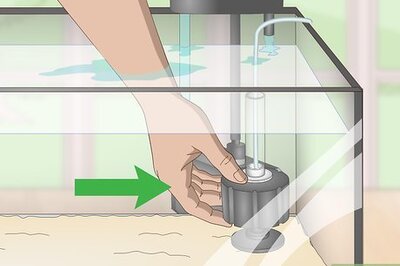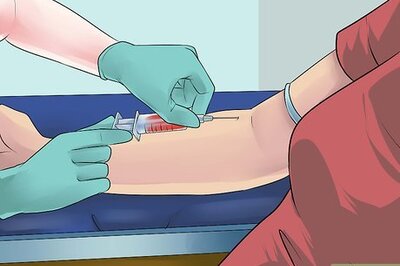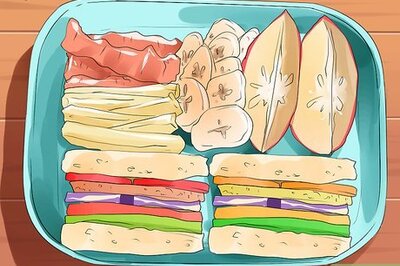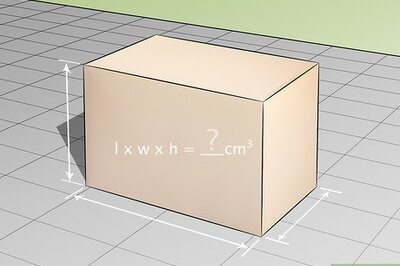
views
Tripoli: Vandals attacked the Italian and British embassies in the Libyan capital on Sunday, hours after Muammar Gaddafi escaped a NATO missile strike that a government spokesman said killed one of his sons and three young grandchildren.
Britain responded to the attack on its embassy complex in Tripoli, which left the buildings badly burned, by announcing it was expelling the Libyan ambassador to London.
NATO's attack on a blast wall-ringed Gaddafi family compound in a residential area of Tripoli late Saturday signaled escalating pressure on the Libyan leader who has tried to crush an armed rebellion that erupted in mid-February. Libyan officials denounced the strike as an assassination attempt and a violation of international law.
The bombing also drew criticism from Russia, which cast doubt on NATO's assertion that the alliance is not targeting Gaddafi or members of his family.
"Statements by participants in the coalition that the strikes on Libya are not aimed at the physical destruction of ... Gaddafi and members of his family raise serious doubts," a Foreign Ministry statement said.
It also said the "disproportionate use of force ... is leading to detrimental consequences and the death of innocent civilians." The ministry called for "an immediate cease-fire and the beginning of a political settlement process without preconditions."
Venezuelan President Hugo Chavez, a Gaddafi ally, also condemned the strike.
NATO acknowledged that it had struck a "command and control building," but insisted all its targets are military in nature and linked to Gaddafi's systematic attacks on the population.
"It was not targeted against any individual," NATO spokeswoman Carmen Romero said Sunday, adding the report of the deaths remained unconfirmed.
British Prime Minister David Cameron, without confirming fatalities, also told the British Broadcasting Corp. that the strike was in line with the UN mandate to prevent "a loss of civilian life by targeting Gaddafi's war-making machine."
A NATO warplane bombed a residential complex taking up an entire block in Tripoli's Garghour neighborhood, which is also home to several foreign embassies. The blast killed Gaddafi's second youngest son, Saif al-Arab, when the Libyan leader and his wife, Safiya, were inside, said Libyan government spokesman Moussa Ibrahim. Saif al-Arab, 29, and three of Gaddafi's grandchildren, all younger than 12, were killed. Ibrahim initially said Saif al-Arab was the youngest.
In addition to his eight biological children, Gaddafi also had an adopted daughter who was killed in a 1986 US airstrike on his Bab al-Aziziya residential compound - retaliation for the bombing attack on a German disco in which two US servicemen were killed. The US at the time blamed Libya for the disco blast.
Neighbors said the complex bombed late Saturday had served as the Gaddafi family home for years. It contained two residences, each with two bedrooms, as well as a den, a large communal space and a separate kitchen.
The kitchen clock, knocked from the wall, had stopped a 8:08 and 45 seconds, the time of the explosion. Cooking pots with leftover food, including stuffed peppers, noodles and a stew, had been covered with aluminum foil. In one of the living rooms, a pile of video games, including FIFA 10, lay scattered on a sofa.
The bombing demolished the ceiling of the main single-story building and tore a hole into the ground, displaying what looked like a basement. What appeared to be an unexploded rocket lay on the ground, which was covered by twisted metal and pieces of concrete. Hours after the blast, onlookers were permitted onto the grounds, some chanting pro-Gaddafi slogans.
In Rome, the Italian Foreign Ministry said its embassy and several others in Tripoli were damaged by vandals and accused the Gaddafi regime of failing to take measures to protect foreign missions. The ministry issued a statement Sunday following reports from Tripoli that a fire had broken out at the Italian embassy. Italy withdrew its diplomats weeks ago.
A Foreign Office spokeswoman said the British embassy buildings, which include the ambassadors' residence, have been almost completely burnt down, with only the shells remaining. She said the buildings had been "ransacked, vandalized and completely destroyed."
British Foreign Secretary William Hague said the Libyan ambassador has been given 24 hours to leave the country. "I condemn the attacks on the British Embassy premises in Tripoli as well as the diplomatic missions of other countries," he said in a statement.
When news of the deadly NATO strike spread, rebels honked horns and chanted "Allahu Akbar" or "God is great" while speeding through the western city of Misrata, which Gaddafi's forces have besieged and subjected to random shelling for two months, killing hundreds. Fireworks were set off in front of the central Hikma hospital, causing a brief panic that the light would draw fire from Gaddafi's forces.
Some rebels questioned the veracity of the claim, saying the regime could be trying to discredit the international military campaign.
"We don't know if it is true or not because Gaddafi is a liar. He is probably trying to put pressure on international community. I will only believe it if you put the body in front of me," said Khaled al-Urfi, a 34-year-old metalworker.
Gaddafi, who has been in power for more than four decades, has fought fiercely to put down an uprising against his regime that began with protests inspired by a wave of Mideast unrest and escalated into an armed rebellion. But the two sides have been locked in a stalemate, with Gaddafi holding much of the western half of the country and the rebels maintaining their eastern stronghold.
NATO warplanes have been carrying out airstrikes in Libya for the past month as part of a UN mandate to protect Libyan civilians.
On Sunday morning, Gaddafi's troops shelled Misrata's port as a Maltese aid ship, the Mae Yemanja, unloaded food and medical supplies, said Ahmed al-Misalati, a truck driver helping move the cargo.
"We were still working this morning when they started firing rockets," said al-Misalati. "Some fell in the ocean, some on the pavement, some in the warehouses, and in the water in front of the boat."
The boat quickly embarked back to sea, he said.
Last week, regime loyalists attempted to mine Misrata's harbor to close the besieged city's only link to the world.
Ibrahim, the government spokesman, said that Saif al-Arab "was playing and talking with his father and mother and his nieces and nephews and other visitors when he was attacked for no crimes committed," Ibrahim said.
The government spokesman said the airstrike was an attempt to "assassinate the leader of this country," which he said violated international law. "The leader himself is in good health," Ibrahim said.
The fatal airstrike came just hours after Gaddafi called for a mutual cease-fire and negotiations with NATO powers to end a six-week bombing campaign. NATO rejected the offer, saying the alliance needed "to see not words but actions."
Saif al-Arab is the second youngest of Gaddafi's seven sons and brother of the better known Saif al-Islam, who had been touted as a reformist before the uprising began. The younger Gaddafi had spent much of his time in Germany in recent years and was not involved in Libyan power structures as were many of his siblings.
Saif al-Arab, who studied and partied for years in southern German Munich, had several run-ins with law enforcement there.
German media reported that Gaddafi's son left Germany in February and returned to Libya. Bavaria's interior ministry later said he had been declared a persona-non-grata and would not be allowed to return.




















Comments
0 comment